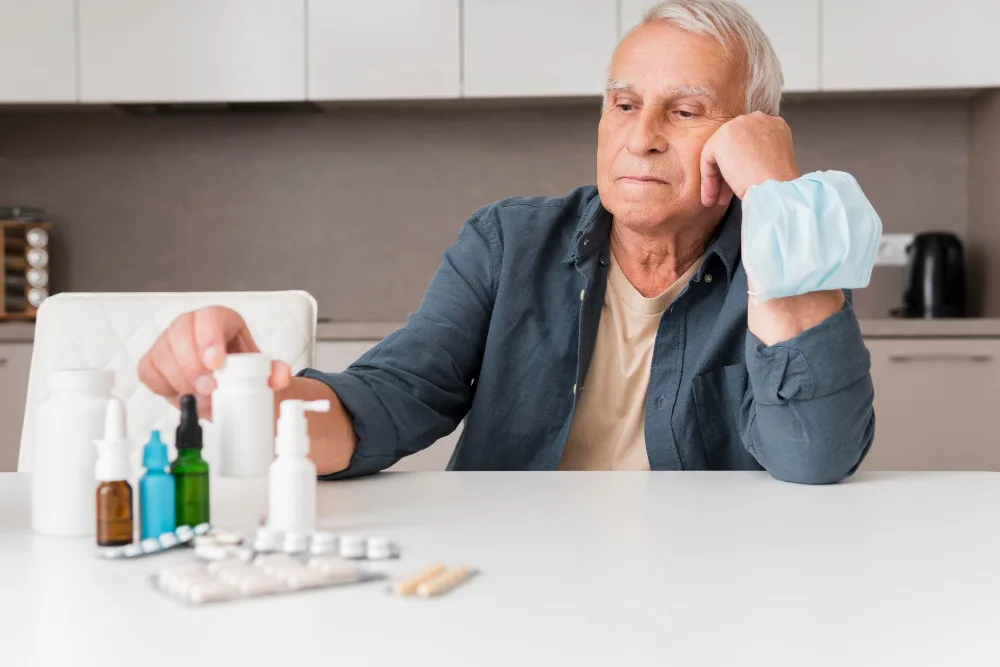
How Home Visit Doctors Improve the Quality of Your Care?
October 24, 2024
How to Handle an Elderly Emergency When You’re Far Away?
January 15, 2025As our population ages, the issue of overmedication among seniors has emerged as a significant concern. With the increasing prevalence of chronic conditions and the desire to manage symptoms, older adults often find themselves navigating a complex web of prescription medications. However, this well-intentioned approach can inadvertently lead to a dangerous phenomenon known as overmedication, which carries severe consequences for the health and well-being of our elderly loved ones. In this article, we are going through all the concerns about overmedication in seniors, Let’s see!
Overmedication: Definitions and Scope
Overmedication refers to the excessive or inappropriate use of medications, whether prescribed or over-the-counter. It can manifest in various forms, such as taking too many medications simultaneously, consuming higher doses than necessary, or using medications for extended periods without proper monitoring. The scope of this issue is vast, affecting seniors across diverse socioeconomic backgrounds and healthcare settings.
Common Causes of Overmedication in the Elderly
Several factors contribute to the alarming rise of overmedication among the elderly population:
- Multiple Chronic Conditions: As individuals age, they often develop multiple chronic conditions, such as diabetes, hypertension, and arthritis, leading to the prescription of numerous medications to manage each condition.
- Polypharmacy: The simultaneous use of multiple medications, often prescribed by different healthcare providers, can increase the risk of adverse drug interactions and cumulative side effects.
- Cognitive Impairment: Age-related cognitive decline or conditions like dementia can impair an individual’s ability to follow medication instructions accurately, leading to unintentional overmedication.
- Communication Barriers: Ineffective communication between healthcare providers, patients, and caregivers can result in incomplete or inaccurate medication information, increasing the likelihood of overmedication.
- Self-Medication: Some seniors may self-medicate with over-the-counter drugs or supplements without consulting healthcare professionals, potentially leading to dangerous interactions or overdoses.
The Impact of Overmedication on Seniors’ Health
Overmedication can have severe and far-reaching consequences for the health and well-being of elderly individuals.
Some impacts include:
- Adverse Drug Reactions: The risk of adverse drug reactions, such as dizziness, confusion, falls, and gastrointestinal issues, increases significantly with overmedication.
- Cognitive Impairment: Certain medications can negatively affect cognitive function, exacerbating existing conditions or contributing to the development of dementia-like symptoms.
- Increased Hospitalization: Overmedication is a significant contributing factor to hospitalizations among seniors, often due to adverse drug reactions or complications.
- Decreased Quality of Life: The side effects and complications associated with overmedication can severely impact an individual’s ability to perform daily activities, leading to a diminished quality of life.
- Increased Mortality Risk: In extreme cases, overmedication can prove fatal, particularly when combined with underlying health conditions or age-related physiological changes.
Signs and Symptoms of Overmedication in Older Adults
Recognizing the signs and symptoms of overmedication is crucial for early intervention and prevention. Some common indicators include:
- Confusion or disorientation
- Dizziness or loss of balance
- Excessive drowsiness or fatigue
- Changes in appetite or weight
- Constipation or diarrhea
- Mood changes or depression
- Increased falls or accidents
If you notice any of these symptoms in an elderly loved one, it is essential to seek medical attention promptly and review their medication regimen.
How to Prevent Overmedication in Elderly Patients
Preventing overmedication in the elderly population requires a multifaceted approach involving healthcare professionals, caregivers, and patients themselves:
- Regular Medication Reviews: Encourage your healthcare provider to conduct regular medication reviews, assessing the necessity and dosage of each prescription, and eliminating unnecessary or duplicative medications.
- Effective Communication: Maintain open and clear communication with all healthcare providers involved in your loved one’s care, ensuring that each provider is aware of all prescribed medications.
- Medication Management Tools: Utilize medication management tools, such as pill organizers or electronic reminders, to ensure accurate dosing and adherence to prescribed regimens.
- Lifestyle Modifications: Explore non-pharmacological interventions, such as dietary changes, exercise, and stress management techniques, which can potentially reduce the need for certain medications.
- Caregiver Education: If you are a caregiver, educate yourself on the medications your loved one is taking, their potential side effects, and the importance of adhering to prescribed dosages and schedules.
The Role of Healthcare Providers
Healthcare providers play a crucial role in identifying and addressing overmedication among their elderly patients. They should:
- Conduct Comprehensive Medication Reviews: Regularly review and reconcile all medications, including prescriptions, over-the-counter drugs, and supplements, to identify potential interactions or duplications.
- Utilize Deprescribing Strategies: Employ evidence-based deprescribing strategies to safely discontinue or taper off unnecessary or potentially harmful medications.
- Promote Shared Decision-Making: Engage patients and caregivers in shared decision-making processes, considering their preferences, values, and goals when developing treatment plans.
- Collaborate with Interdisciplinary Teams: Work closely with other healthcare professionals, such as pharmacists and geriatricians, to ensure coordinated and comprehensive care.
- Provide Ongoing Monitoring: Regularly monitor patients for signs of overmedication and adjust treatment plans as needed, prioritizing patient safety and well-being.
Family and Caregiver Roles
Family members and caregivers play a vital role in preventing overmedication among their elderly loved ones.
- Be an Advocate: Actively participate in your loved one’s healthcare decisions, ask questions, and voice concerns about medication regimens and potential side effects.
- Maintain Medication Records: Keep a comprehensive list of all medications, including dosages, frequencies, and potential interactions, to share with healthcare providers during appointments.
- Observe for Side Effects: Closely monitor your loved one for any changes in behaviour, mood, or physical symptoms that may indicate adverse reactions to medications.
- Encourage Compliance: Assist your loved one in adhering to prescribed medication regimens, ensuring they take the correct dosages at the appropriate times.
- Seek Support: Utilize available resources, such as support groups or counseling services, to better understand and manage the challenges of elderly care services.
Effective Alternatives to Medication for Senior Care
While medications play an important role in managing various conditions, exploring non-pharmacological alternatives can help reduce the risk of overmedication and promote overall well-being. Some effective alternatives include:
- Lifestyle Modifications: Encouraging healthy lifestyle choices, such as a balanced diet, regular exercise, and stress management techniques, can improve overall health and potentially reduce the need for certain medications.
- Complementary and Alternative Therapies: Explore evidence-based complementary and alternative therapies, such as acupuncture, massage, or mindfulness practices, which may provide relief for certain conditions without the need for additional medications.
- Cognitive and Behavioral Interventions: Cognitive-behavioral therapies, reminiscence therapy, or other psychosocial interventions can be effective in managing conditions like anxiety, depression, or dementia-related behaviours, potentially reducing the need for psychotropic medications.
- Environmental Modifications: Making simple environmental modifications, such as improving lighting, reducing clutter, or installing assistive devices, can enhance safety and independence, potentially reducing the need for certain medications.
- Social Engagement and Support: Encouraging social engagement, fostering strong support networks, and addressing isolation can significantly improve mental and emotional well-being, potentially reducing the reliance on medications for these conditions.
To summarize, the alarming rise of overmedication among seniors is a complex issue that demands our attention and immediate action. By understanding the causes, recognizing the signs, and implementing preventive measures, we can safeguard the health and well-being of our elderly loved ones. Healthcare providers, caregivers, and family members must work together to promote medication safety, explore alternative therapies, and prioritize a holistic approach to senior care.

